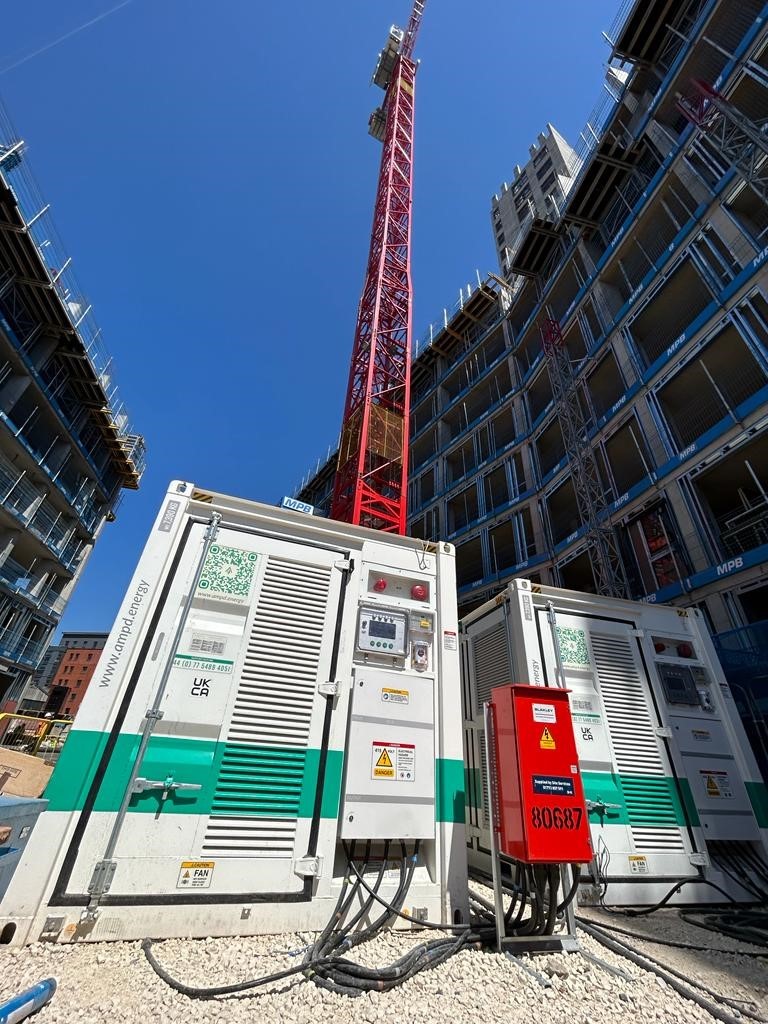Bowmer + Kirkland believes it is the first construction company to use battery energy to power most of its equipment on site.
A project at West Bar, in Sheffield, is probably the first site in the country where the tower crane, mast climbers, hoist and temporary site supply to two buildings are all powered by only two batteries – this has saved 27 tonnes of CO2 in just the first two weeks of using this energy source.
The successful implementation of this sustainable energy is the culmination of years of research and development.
Initially B+K’s research and persistence recognised the carbon savings associated with the Punch Flybrid kinetic energy recovery system.
Developed for Formula 1 to recover energy from regenerative braking systems, the Punch Flybrid system uses a robust and durable flywheel energy storage system to significantly downsize generators powering tower cranes and other dynamically used equipment on site.
Construction site generators are inherently inefficient. Adding a flywheel to store kinetic energy, however, introduces efficiency, dramatically reducing fuel consumption and reducing carbon emissions.
Generators on construction projects are typically sized for peak loads. However, most of the time they run at low load factors, which results in poor fuel economy and high emissions. This is especially the case when running equipment like tower cranes, which oscillate between total idleness and full power.
On average B+K runs 20 tower cranes and 200 mast climbers on their sites at any one time; traditionally powered by generators. Bowmer + Kirkland conducted months of research into Flybrid feasibility and testing with their supply chain and instigated a first year roll out of the tech nationally across their construction sites ensuring B+K were the first UK contractor with multiple Flybrid units on one site.
From January – July 2023 using the Flybrid product alone, Bowmer + Kirkland saved 450 tonnes of carbon/172,000 litres of fuel.
Pushing the boundaries further led the team, in conjunction with equipment supplier Select, to investigate the possibility of battery power to enhance sustainability on site. As a result B+K was the first to power two tower cranes from one battery unit on trickle charge using a mains grid connection – this saved 98 tonnes of CO2 in just three months.
That pilot scheme was so successful that on their West Bar site in Sheffield, they are powering the tower crane, mast climbers, hoist and temporary site supply to two buildings via only two batteries on trickle charge. They are now looking into to using green renewable power to trickle charge the batteries – which would reduce carbon emissions even further.
To enable B+K to do this and change long-held attitudes and habits, they organised a number of pilot trials for the Flybrid and battery technology, involving all parties to demonstrate reliability and capability in reducing fuel consumption and realise carbon savings.
To support this, the team formulated a self-populating carbon spreadsheet and included all combinations of lifting equipment to demonstrate to site managers the fuel and carbon savings, which was instrumental in persuading them to adopt the technology. Equipment was tested to operating limits which was only made possible by the technical experience and dedication from B+K’s group crane team to drive innovation.
Flybrid and battery technology is now a standardised offering across Bowmer + Kirkland sites.
Bowmer and Kirkland director, Matthew Cruttenden, said: As the company strives for our zeroby40 target, our group crane team has been instrumental in changing attitudes and increasing awareness and understanding of sustainable energy sources available.
“Traditionally, construction sites have powered plant with diesel-guzzling generators. Our operational staff now understand the possibilities open to us to protect the environment, reduce our emissions and save money.
“Our development and collaboration with specialist suppliers has revolutionised the way we power our site operations – who would have thought we could power an entire site by plugging into a couple of battery units on trickle charge? Within the construction community we are leading the way with our research and innovations.”



